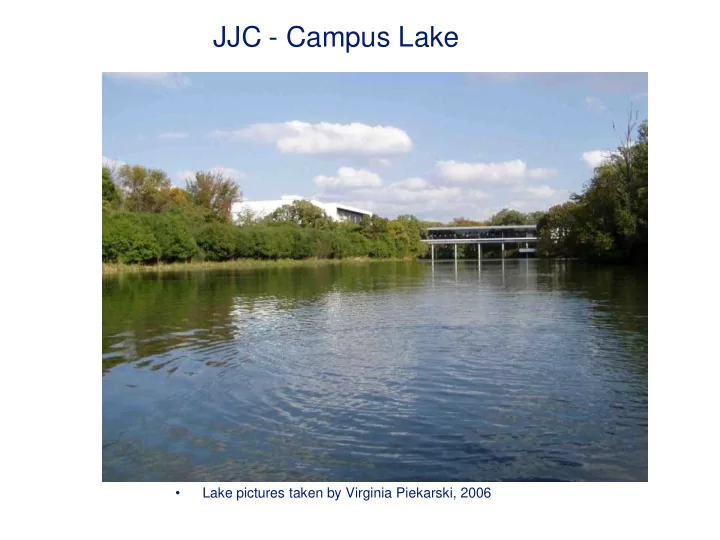

JJC - Campus Lake • Lake pictures taken by Virginia Piekarski, 2006
JJC Lake Rehabilitation & Management Project The Joliet Junior College Lake is a central aesthetic feature of the main campus. The 5.8 acre lake has a 362 acre watershed which includes the college campus; parking lots; wooded, farm and open fields; and residential and commercial developments. The JJC Lake is eutrophic; this condition causes water quality degradation.
A grant-funded rehabilitation project is underway to restore the natural beauty and ecological health of the JJC Lake. Fertilizers, pesticides and herbicides from surrounding lawns and agricultural fields flow into the lake through storm water runoff. Nutrient-rich sediments accumulate, causing an explosion of plant and algal growth. This depletes oxygen levels, which leads to fish kills. The accumulation of sediment has also reduced the lake’s water -holding capacity by 20 percent. The rehabilitation efforts will address these issues with the goal of restoring the quality, health and natural beauty of the lake.
West View from Bridge, August 2006
East View, August 2006
Aquatic Vegetation Flourishes in Nutrient Rich Water
Excessive Aquatic Vegetation Depletes Dissolved Oxygen which Results in Fish Kills
Drainage patterns, Joliet Junior College, 1215 Houbolt Road N
• Lake Project Highlights: • 6,300 cubic yards of sediment will be dredged from the lake and distributed on the college’s agricultural fields; after dewatering, the nutrient-rich sediment will be spread over the Ag field • Best management practices (BMP’s) will be established and implemented to reduce non-point source pollution and ensure the long-term health of the lake • Separators and Wetland Swale will be installed to filter runoff water from the parking lots • Bioswales and a Bio-Filter Cell will be installed to filter runoff water from agricultural fields, grass fields and residential areas before it enters the lake • Native plant species will be planted along the shoreline to prevent soil erosion
JJC Lake Rehabilitation & Management Project BioFilter Cell BioSwale Separators #3 Vortex Dewatering Pond #2 FloGard Wetland Swale #1 Snout No Dredge Zone
• Benefits: • Unsightly floating debris, odor problems and sediment buildup will be reduced • A clean, healthy habitat for fish, wildlife and native plant species will be restored • Approximately two feet will be added to the depth of the lake on average, restoring the lake’s water -holding capacity • Education and research opportunities will be increased • This campus asset will continue to provide an outdoor laboratory for JJC faculty & students
The Lake Dredging Project and Installation of BMP’s are scheduled for the Fall 2009. To learn how you can help restore the JJC Lake Watershed, refer to the JJC Lake Fact Sheet. Funding for this project provided, in part, by the Illinois Environmental Protection Agency through Section 319 of the Clean Water Act.
Recommend
More recommend